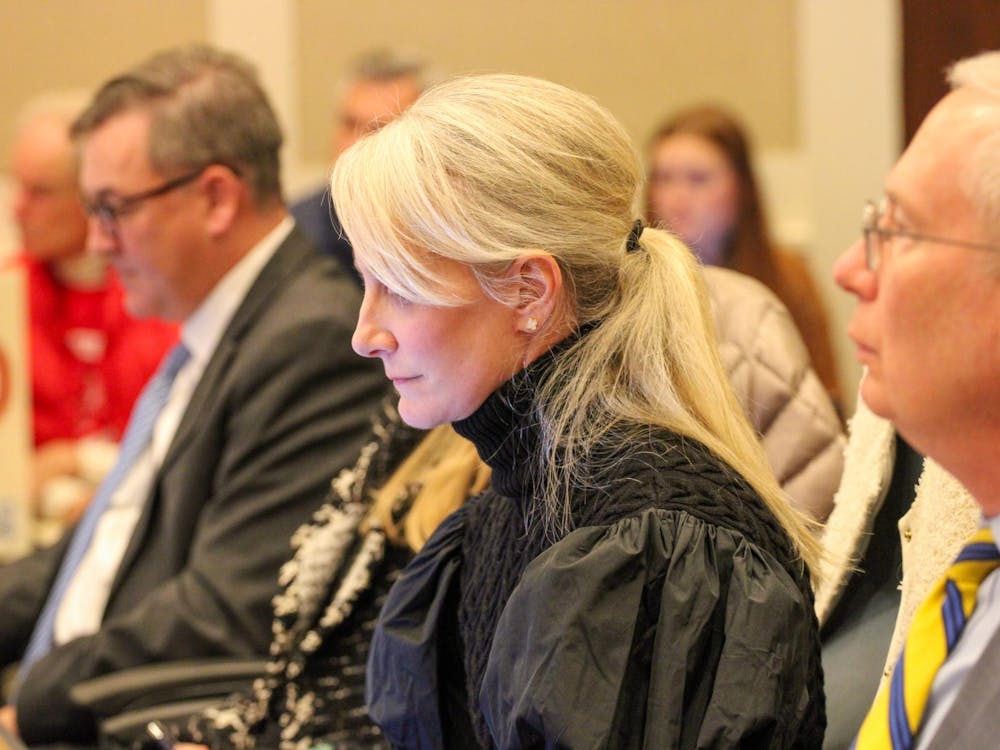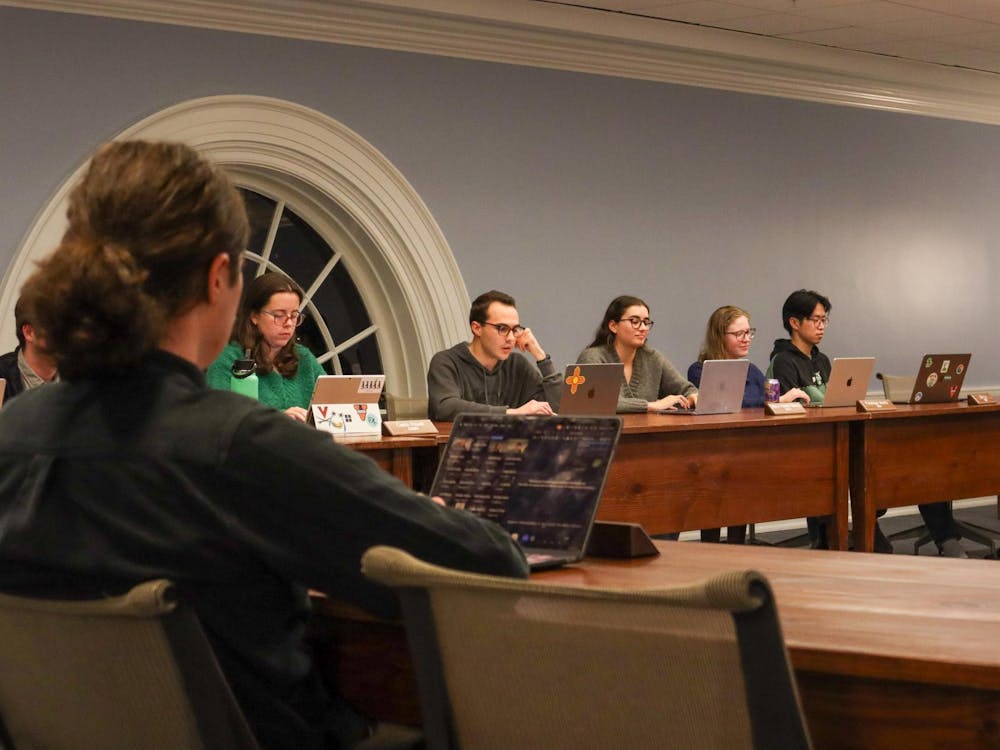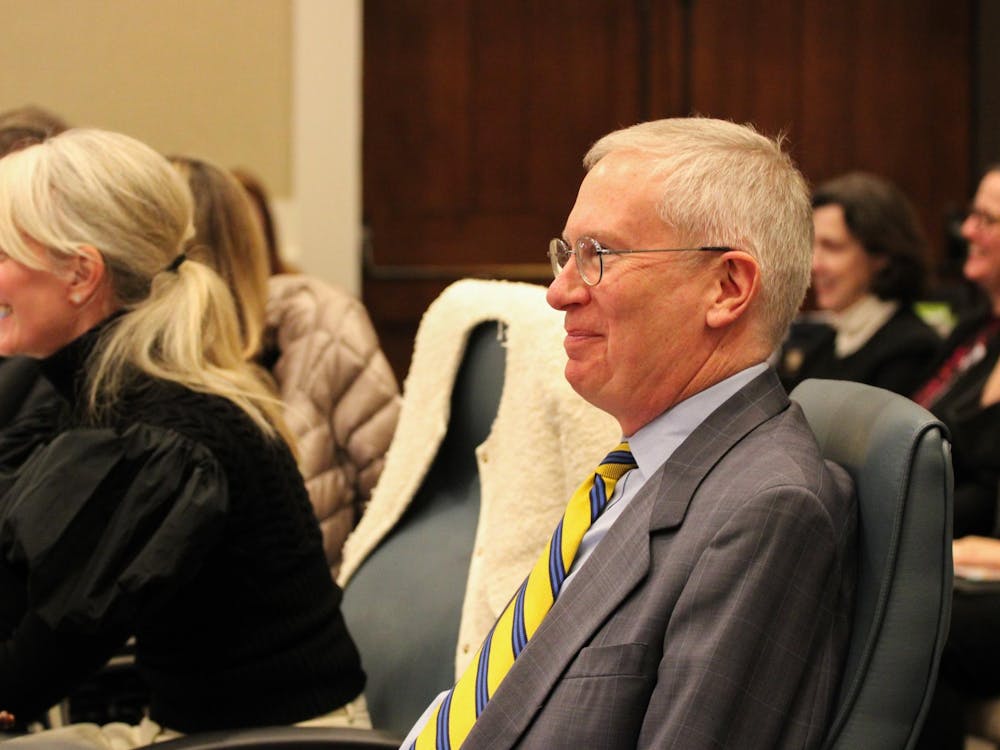The tradition of running nude through the Academical Village is a lot more complicated than choosing when to disrobe, especially when it enters the legal realm.
Ever since streaking the Lawn became a popular phenomenon in the 1970s, no distinct penalty has been drawn up to punish those students who choose to bare all.
University Police do not keep records of citations and arrests for streaking, but University Police Capt. Michael Coleman said this does not mean students are never arrested.
"Generally speaking it's not unusual to see a few arrests every year, but not a high number," he said.
Most recently, three University students -- fourth-year College students Erich J. Wasserman, Aaron J. Wyse and Benjamin M. McCoy -- and three non-University students were charged with indecent exposure in their traditional romp across the Lawn, in the early morning hours of Oct. 18.
Charges for such offenses can range from indecent exposure to trespassing and disorderly conduct to a full-fledged sex offense, Coleman said.
Penalties also can vary accordingly.
In general, he said, streakers are charged with indecent exposure but the penalty is left to the discretion of the judge or commonwealth attorney who presides over the case.
"Indecent exposure is a sex offense, sort of. It sometimes carries that connotation," he added.
Coleman emphasized the complexity of labeling streaking an offense of indecent exposure versus other offenses that fall into the same category. "While students don't particularly feel threatened by streakers, they might feel threatened by other instances of indecent exposure," he said.
For instance, on Oct. 8, 37-year-old James Gilbert Stearn was charged with indecent exposure for an incident that occurred on University Way.
But while police deemed that Stearn's actions were lewd enough to incur penalty, the boundary for streaking is less concrete.
Streaking raises the issue of where to draw the line -- should University students be treated more leniently for indecent exposure than non-University students?
"What are the courts going to do if you don't treat the offenses in the same way?" Coleman said. "There are a couple of things you have to consider. Sometimes it's not a hard and fast issue. It's pretty complicated."
Coleman said part of the complexity arises from the "mixed population" of the University community -- students and non-students interacting in one place.
"I'm not saying one's worse than the other -- don't get me wrong. But when you're dealing with a mixed population, you have to look at the overall picture," he said.
Since most streaking occurs on Grounds, Charlottesville police rarely deal with the issue of indecent exposure as a result of streaking.
Charlottesville Police Lt. F. G. Upman said, as is the case with streaking on Grounds, streaking in off-Grounds locales would also incur an indecent exposure citation that could potentially be interpreted as a sex offense.
Coleman said punishments for indecent exposure range anywhere from community service to fines. Theoretically, a jail sentence could be imposed but Coleman said this is not usually the case.
"Technically it's a Class I misdemeanor ... It has the potential for one year in jail or a $2,500 fine," he said. "But is that what people usually get? No."
Student Legal Services Director Lester Wilson said students rarely are harshly punished for streaking the Lawn.
"All they can really charge you with is indecent exposure," Wilson said, who noted that it is unlikely to be chalked up as a sex offense.
For Education School students, however, the line between being charged with indecent exposure and a sex offense does not matter: Either way, their permanent records could be so scarred that they cannot be hired in schools.
"I would definitely counsel those interested in becoming teachers not to" streak, said Kathleen Lyons, National Education Association spokeswoman. "It would indeed put a black mark on your record."
Even though Lyons urged aspiring teachers to avoid stripping in public, Steve Plaskon, the Education School's coordinator of admissions and student services, said in his 24 years at the University, he has never heard of an Education School student being seriously concerned about the implication of streaking on his or her record.
"It's never been an issue," Plaskon said.
He did maintain, however, that any Education School student with a felony on his or her record could face problems when applying for a job.
"A Curry student who has a felony is in trouble," he added.
Streaking, if charged as a form of indecent exposure, is marked as a misdemeanor, not a felony.
But Lyons contended that any sort of blemish on an aspiring teacher's record could be detrimental to his or her chances of being hired.
"Indecent exposure or any kind of sex offense would automatically disqualify you," she said. "Most states would rather not deal with the hassle of that kind of record and go on to the next candidate."
She stressed the need to think more thoroughly before making hasty decisions.
"Have some other kind of fun!" she added.
In practice, however, not all Education School students exhibit such caution: Some choose not to streak not out of fear of career impediments, but out of personal choice.
"I just don't streak because I choose not to," fourth-year Education student Anna Pair said.
Second-year Education student Meredith Wiley said she was not even aware of potential ramifications for streaking.
"I haven't heard anything about it," Wiley said.
(Cavalier Daily Associate Editor Amy Shapiro contributed to this article.)






